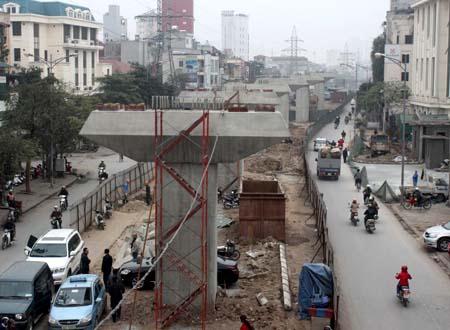|
A proposal made by the Chinese contractor
in the Cat Linh-Ha Dong railway project has been denounced by experts as
“illegal” and “unacceptable”.

Deputy Minister Hoang Trung Hai has requested the
Ministry of Transport (MOT) to check the project’s estimates and release a
final decision on the Chinese proposal. The contractor is asking for a $339
million funding increase which, if approved, would bring the cost of the
project to $852 million.
The document released from the Deputy Minister’s office
requests that MOT join forces with the Ministry of Planning and Investment
and other agencies to work with the appropriate Chinese agencies on the
Chinese ODA (official development assistance) capital complement to the
project.
The railway project, kicked off in October 2011, had an
initial price tag of $552 million, of which $419 million had been pledged
from the Chinese through their ODA.
Under the terms of the project, a Chinese corporation
acts as the EPC (engineering, procurement, construction) contractor. The
railway is expected to be put into operation by June 2015.
However, problems in the site clearance and the
contractors’ capability have led to the delays. Meanwhile, MOT, following a
request by the Chinese contractor, has proposed the government approve a $339
million increase in the budget.
MOT explained that the project would need an additional
$221 million for construction costs, $20 million for equipment and $25
million for site clearance.
The news comes as no surprise to many Vietnamese, but
has certainly angered them. It has proven to be a familiar tactic of Chinese
contractors who have been awarded projects in
The modus operandi has become all too recognizable. A
Chinese contractor wins a project by offering a bid 20-30 percent lower than
his rivals. Subsequently, the contractor begins work by implementing the
easiest elements of the project at the early stages. Then, “snags” emerge. A
deadline extension is urgently requested, followed by demands for an increase
in funding for the “unforeseen” difficulties.
The Nhieu Loc-Thi Nghe canal environment sanitation
project is a case in point. The project was initially slated for completion
by 2008. However, it was only in 2011 that the project became fully
operational, three years late and $120million over budget. The investor
ultimately had to shell out $320 million on a project with an initial
estimate that the contractor had won with a bid of of $200 million.
Nguyen Tien Lap, an ODA expert, has many times warned
that
Dr Nguyen Dinh Tham from the Hanoi Civil Engineering
University affirmed that “there is no legal foundation for such a sharp
increase of the investment capital” (by nearly 100 percent).
An expert has suggested that the government of
Dat Viet
|
Chủ Nhật, 27 tháng 4, 2014
Đăng ký:
Đăng Nhận xét (Atom)
Không có nhận xét nào:
Đăng nhận xét